The farmers' protest is ostensibly directed against the taxation of diesel - but across Europe it is about the "Green Deal" and the power struggle between Ursula von der Leyen and her renewed challenger Manfred Weber, writes EU expert Johannis Wilhelm Friesinger.
 IMAGO
IMAGO
Industrial agriculture must be brought to its knees. That's what Diederik Samsom said when he entered Brussels' Berlaymont building in 2019 as an adviser to Frans Timmermanns, first executive vice-president and commissioner for climate action in the von der Leyen Commission. The Zimmermanns/Samsom team almost succeeded. Desperate farmers are now taking to the streets all over Europe.
Timmermann's dream of becoming EU President did not work out; Samsom is also out of the running. Because elections to the EU Parliament are coming up in June, Commission President von der Leyen is currently ostensibly in favor of farmers. Is the tide turning in favor of farmers? Away from the destruction of agriculture towards sensible management? In France, President Emmanuel Macron is canceling the Von-der-Leyen Green Deal.
The Green Deal leads to misery for farmers
Agricultural policy is at the heart of the EU, and farmers are victims of party political machinations in the EU Parliament. After the 2019 EU parliamentary elections, Manfred Weber (CSU) and Ursula von der Leyen (CDU) met in the Brussels political arena. Weber was the leading candidate of the European People's Party, of which both the CSU and CDU are members, and was supposed to become President of the EU Commission as the representative of the strongest party. The European People's Party became the strongest force in the 2019 EU Parliament elections. However, French President Emmanuel Macron (En Marche!) definitely did not want the leader of the largest party in Parliament to become Commission President. A historic deal was reached. It was not, as promised, that Parliament elected the President of the Commission, but rather the heads of state and government.
Macron had in mind a woman who was born in Ixelles near Brussels, the daughter of an EU bureaucrat. A German, a confidant of the then Chancellor Angela Merkel (CDU), in order to also involve German politics. In exchange for another woman, the French Christine Lagarde, who, as President of the European Central Bank in Frankfurt, wanted to implement a monetary policy in favor of heavily indebted France. Merkel could not refuse von der Leyen for the sake of her friend and broke the promise she had originally made to Weber.
The disappointed Weber returned to parliament. On the other hand, the Dutch social democrat Frans Timmermans (PvdA) was pleased. He was the leading candidate of the S&D, the European Social Democrats. Timmermans was appointed First Vice-President of the Commission to ensure that all major European political families are represented in top positions. This is how political deals work in the EU - posts are moved to forge coalitions, content comes much later.
Like Weber, Timmermans had also hoped to become Commission President. That wasn't planned, but he got more than he bargained for: after von der Leyen, he became the highest official in the commission's bizarre hierarchy - first executive vice president and commissioner for climate protection. In agreement with the majority of heads of government, climate policy and the fight against farmers should make the EU the moral green leader in the world. Given the good economic situation, that seemed possible. Timmermans took on the task of implementing this.
The EU's New Deal as a fight against the farmers
As an enforcer, Timmermans hired a remarkable man: Diederik Samsom. He studied nuclear science in order to collect arguments against nuclear power. So a man who first has an opinion and then tries to find facts that fit it. Samsom became a kind of paid campaigner for Greenpeace.
Samsom became Timmermans's head of cabinet. And suddenly Samsom was able to tackle what he would never have been able to do at Greenpeace or in the Netherlands: make the whole of Europe radically green. He wrote a paper with the propaganda name “Green Deal”, in reference to Franklin D. Roosevelt's New Deal in America in the 1930s.
At the presentation of the Green Deal in Brussels, von der Leyen positioned herself as a great helmsman. She almost literally pushed Timmermans into the background. Timmermans has rarely looked so grumpy. But he didn't stay between the scenes for long.
Because von der Leyen was soon distracted by the Covid-19 virus and later the Russian attack on Ukraine. The same applied to the heads of government who had ordered the Green Deal from the Commission and now received it - more radical than expected and uncontrolled. Timmermans and Samsom had free rein. Also because von der Leyen's European People's Party, Timmerman's S&D and Macron's Liberals in the European Parliament supported the Green Deal.
And thanks to another famous EU German, Martin Selmayr, all the other commissioners had become dependents of the president and the first vice-president: the von der Leyen and Timmerman team ruled through, Selmayr executed. Because he is the man who pulls the strings in the background. It was Selmayr who, as head of cabinet of Luxembourg Commission President Jean-Claude Juncker (CSV), centralized the power of the Commission to the office of the Commission President between 2014 and 2019. The EU is about power, not about the citizens, who have to pay for the intrigues that are being hatched in back rooms far from Brussels.
Part of the Green Deal is the so-called farm-to-fork strategy, which should implement the Green Deal. The strategy aims to make the European food system more sustainable and reduce its impact on third countries, the theory goes. The strategy was implemented through a large number of individual laws that burdened farmers in the EU and were intended to force them out of the market and out of their fields - such as reducing the cultivated areas, excessive fertilizer bans, reducing the number of animals kept and many other mundane details only Brussels bureaucrats could come up with.
From 2022 onwards, legislative proposals from the Commission were gradually sent to the Council (member states) and Parliament. At the same time, Dutch farmers began to rebel. Thousands of farms should be expropriated for Timmerman's vision of a nature park. With their new party “Boer Burger Beweging” (Peasant Citizen Movement BBB) they quickly won victories in the Dutch provincial and upper house elections. The Dutch Christian Democrats, members of Weber's European People's Party, were thrown out of the race. Since then, the conservative majority in the EU Parliament has been weakening and is expected to lose a massive amount of seats, power and positions.
Farmers' resistance is growing in the Netherlands
The victory of the Boer Burger Beweging therefore met with great response in Brussels, with fear particularly spreading among Weber's European People's Party. The Christian Democrats or bourgeois conservatives had already been pushed out in Italy and France by liberals and so-called populists. Now the Dutch Christian Democrats, the little sister of the German CDU/CSU, were also gone.
Weber warned von der Leyen. She had to change course and gain time. French President Macron, who promoted von der Leyen to Commission President, also began to put on the brakes. But von der Leyen didn't listen. She was busy with Ukraine, flying around the world in private jets to be welcomed as President of Europe. And she couldn't - and perhaps didn't want to - stand up to the powerful and clever Timmermans and his Samsom.
Weber then made a remarkable decision. The EPP spoke out against the Green Deal. The regulation on the sustainable use of plant protection products (SUR) had to be taken off the table, or at least weakened. The SUR proposed by the Commission stipulated that farmers should use 50 percent less pesticides by 2030. A dramatic battle broke out in Brussels. Timmermans clashed with the majority of the EU Parliament, which had previously applauded him. Now suddenly there was resistance and he had to lobby the MPs. Timmermans lost. The SUR was off the table.
Incidentally, the EPP was not just concerned with the farmers. She had seen in the Netherlands that the peasants had been joined by the bourgeois middle class in rural and suburban areas, with less than 1 percent of the electorate. Farmers were the canary in the coal mine, signaling the impending danger – gas in the mines, voters fleeing in the EU. Because the Green Deal, which extends beyond agriculture, would also affect ordinary people, who would be forced to insulate their homes and make other interventions in their personal lives. The EPP's core electorate had to be retained by weakening the Green Deal.
The protest is spreading
Despite the U-turn in national capitals and Brussels, first German, then French and Belgian farmers took to the streets. Thousands of tractors blocked the highways, Berlin, Paris and Brussels were blocked.
That was paradoxical. Because in 2019, when the heads of government ordered the Green Deal, and in 2020, when the Green Deal was presented, the farmers did not protest in the capitals. Only now are they taking to the streets.
But the German special tax on agricultural diesel and a free trade agreement with South America, including for agricultural products, have shaken farmers up. The much more fundamental Green Deal did not do this. Farmers' stakeholders in national capitals and in Brussels had failed to oppose him. Samson's statement that industrial agriculture must be “brought to its knees” should have set off alarm bells. But the interest groups did not dare to protest because there was a lack of political fertile ground - both in the national capitals and in Brussels. Only the EPP's about-face after Timmermans' departure and national election defeats, such as that of the CDU/CSU in Germany, offered fertile ground.
Whether this can satisfy farmers remains to be seen. The regulatory burden built up over decades remains high. And “green” thinking has by no means disappeared from public service and politics. Some candies are thrown to the farmers. Next year, farmers will be allowed to sow 4 percent of their areas that should actually be reserved for nature. It was Von der Leyen who announced this in talks with farmers in Brussels. She tries to defend herself and put Weber in the background.
The Green Deal should still go through
But what von der Leyen offers is rather poor. Timmermans' successor, the Dutch Christian Democrat Wopke Hoekstra, explains at climate summits that the EU should emit 90 percent fewer greenhouse gases by 2040 than in 1990. He wants to soon phase out all fossil fuels. Agriculture, which is responsible for 12 percent of greenhouse gas emissions, is massively affected. However, what tractors and combine harvesters will then be powered by remains a mystery. Alternative fuels are rare. And electrification is not possible for large machines. They would become too heavy, compact the soil and the “Made in China” batteries would run out after an hour.
The social demands placed on farmers are high and will remain so. They should ensure food security, healthy, inexpensive and safe food, increase sustainability, preserve the landscape and remain as small family businesses as possible. As more and more EU citizens live in cities and feel disconnected from the countryside, understanding of farmers will decrease rather than increase. At the same time, EU agricultural subsidies expressed in terms of purchasing power have halved in 20 years. They now amount to 300 billion euros for seven years for the 27 EU member states. In order to bring them back to the level of 20 years ago, an additional 300 billion euros would have to be spent. And the farmers' opponents are powerful: multinational food companies achieve much higher profit margins than farmers through global imports. Once Europe is supplied entirely from South America, these will continue to rise.
A political solution that reconciles the social wishes and demands of farmers with a financially viable existence for farmers is still missing. Much will depend on the fight between von der Leyen and Weber.
The “green” Ursula von der Leyen is aiming for a second five-year term as Commission President after the federal election. She promises the heads of government anything they want to achieve this. But Weber also wants to rise in the Brussels hierarchy and seems to have a better feel for the voters in the EU. Since each country is allowed to appoint a commissioner, Weber can only become a commissioner if von der Leyen does not become Commission President. Whether farmers will take to the streets again will depend in part on this German-German fight. Because it's not about sensible politics - it's about positions.


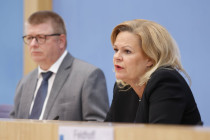

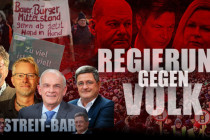
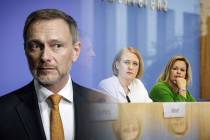
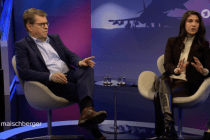
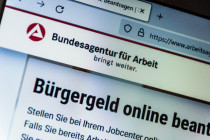
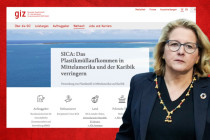
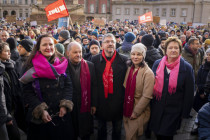
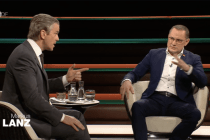
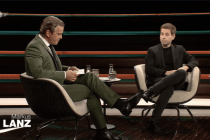
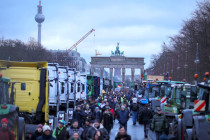
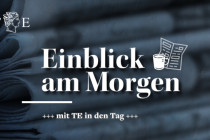
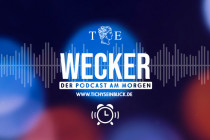





You must be logged in to write a comment or reply
Bitte loggen Sie sich ein
Since no empire has ever lasted for too long - depending on the technical possibilities of communication and the way of life - the collision between the reality of life and the mirage of the green totalitarians should not be long in coming in these fast-moving times. The EU is a fantasy and coercive construct that cannot prevail against the reality of the people's self-image - less so that of Germany - especially since the EU has nothing to do with democracy at all. The British were the first, others are guaranteed to follow and organize themselves as a loose association that affects little more than the economy. Anyone who spends too long ... More
The EU’s “green deal” is economic war against its own population. Slowly more and more people seem to understand this.
Is it madness or evil?
Who has the right to interfere with another person's right to life and to damage or destroy it? And that’s supposed to be “democracy”?
You can read it on Wikipedia: The EU Parliament is only “partially representative”. Around 810,000 Germans elect a representative, as do around 65,000 Luxembourgers or Maltese. This wouldn't be so bad if we sent our best staff to Brussels. But who, pray tell, gave UvdL legitimacy to rule us from the ground up?
The vdL family is firmly embedded in the aristocratic circles of Europe, don't underestimate what that means, especially where the Windsors and City of London enjoy extreme influence. Ursula is also best friends with Bill G and Klaus.
I can understand the farmers' concerns regarding the diesel subsidy. Unfortunately, I increasingly see this farmers' movement as saying “we are against it” without making any alternative suggestions of our own. I read that some farmers are also against the flower strips. Sure, you can talk about it. But there is no counter-proposal either, I would expect someone to say, we don't want a flower strip because it's difficult to manage, etc. In order to compensate for the dwindling insect population and to make more living space available again, we propose measure XY. That would be constructive. Just going against it doesn't bring any solutions.
True….unfortunately the protest…or. The opinions expressed by most farmers are simply “against”….also against an “alternative government”….everything should stay as it is….if only the money keeps flowing and the farmers are left alone. The bottom line is: We don't care if the country and its people go to the dogs...as long as we're doing well...and the worse off the population is...the higher you can raise the prices. I am deeply disappointed in the farmers' movement... and the farmers' protests... I thought this could create a yellow vest movement across society... but apparently they are only demonstrating against the right... in this respect... the elections wait and … More
That's too short-sighted! Over 43 farmers give up every day!! Definitely not because they are doing too well - talk to some of them! If you buy food from overseas, it will be cheaper because everything is generally cheaper there and the farmers are hardly subject to any regulations. The subsidies - German farmers receive much less than those from other countries - are practically to be understood as reverse tariffs, because here you cannot compete against overseas competition. Every country needs as much self-sufficiency as possible, right?!
For example, rejecting large-scale PV systems and wind turbines on their land, even if they would bring in (tax) money. What use are the flower strips if their insect inhabitants are chopped up by the next wind turbine?
Habeck has already had 25 bird species removed from nature conservation as grounds for objection to wind turbines, such as the black stork and the red kite.
The perfect puppet was brought into office with von der Leyen. Either way, it not only impoverishes farmers in the EU, but also the population at the same time. As the little annals said, let's let Europe die together.
The globalist “elites” will not be so easily put in their place. Before they give up their plans for world domination, we will experience a few surprises. You have already seen several times that people in democratic countries will believe any nonsense if you add fear to it. And Germany in particular has no chance against these machinations because we have far too many followers who believe everything the news people tell them.
It's not about positions, it's about the implementation of the feudal totalitarian misery state. And the majority of European voters still think it's absolutely great. Even if the Germans once again provide 150%.
The lion's share of Brussels' budget goes to agriculture. This is for historical reasons; people never wanted to experience famine again in Europe after the previous experiences. With the increase in huge agricultural areas in Eastern Europe, things have changed, and that's what it's all about. If the UA were added, then even more. In Poland, grain from the UA is already being burned - to get rid of the annoying competition. Despite all the justified criticism of Brussels, they are not completely stupid either. It's a lot of money and the question is: Who gets the money? Us or the others?
The EU is a repressive empire that expands its power until the suffering of the people becomes overwhelming.
If it then says: “Ah! Ça ira” let no one say that they were not warned.
» what the reactionary says. No one cares
Not when he says it - it seems absurd.
Not a few years later – it’s obvious.”
Nicolás Gómez Dávila